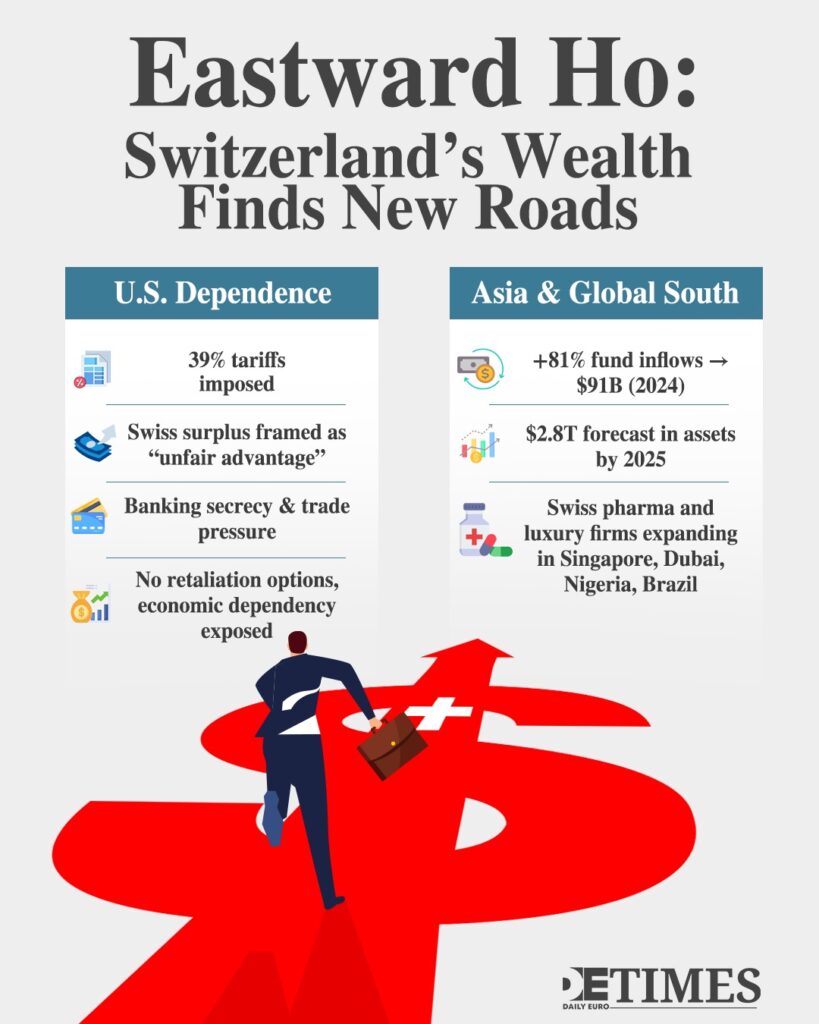Switzerland finds itself bearing one of the world’s harshest tariff rates. The 39% levy threatens thousands of jobs in an export-dependent economy.
Swiss businesses were stunned by the overnight announcement that their country faces devastating import tariffs, partly because of Switzerland’s status as the world’s biggest centre of gold refining. The irony cuts deep.
Switzerland processes gold from around the globe, then exports it to American markets.
Swiss National Bank analysts argue that gold trade should be excluded from the trade balance calculations, as these outsized gold exports distort the economic relationship between both economies.
Yet Washington views Switzerland’s $38.3 billion trade surplus as unfair advantage.
Hong Kong Overtakes While Switzerland Stagnates
Economic tides shift eastward as Switzerland faces American trade hostility.
Hong Kong's cross-border wealth may reach $2.8 trillion in 2025, overtaking Switzerland as the world's largest cross-border wealth hub by 2027 to 2028.
This timing stings as Switzerland built its wealth management supremacy over decades of careful relationship building. Now reports by UBS and Boston Consulting Group predict Hong Kong will overtake Switzerland as the world’s number one hub for cross-border wealth management, whilst America punishes Swiss economic success.
The numbers tell a stark story. Hong Kong’s asset management industry hit $4.5 trillion in assets under management in 2024, with net fund inflows surging 81% to $91 billion. Swiss wealth managers watch clients consider Asian alternatives.
Limited Leverage in Trade War Games
Swiss officials try to negotiate from a position of weakness.
Switzerland unilaterally abolished all customs duties on industrial goods as of 1 January 2024, allowing more than 99% of US goods to enter the Swiss market without duties.
This gesture meant nothing to American negotiators. Switzerland lacks the economic mass to push back against Washington's demands. Unlike the European Union or China, Switzerland cannot threaten meaningful retaliation.
The Swiss watch industry exemplifies this vulnerability. The $50 billion Swiss watch industry was sent reeling by the initial 31% tariffs, with officials seeking new trade agreements after blanket tariffs were imposed. Luxury timepieces become diplomatic bargaining chips.
Europe Beckons as America Alienates
Without substantial negotiating power, Switzerland may need to reconsider its economic orientation. The country’s traditional neutrality becomes economically untenable when major trading partners weaponise commerce.
European integration offers one pathway forward. Deeper ties with Brussels could provide collective bargaining strength against American trade aggression. Swiss voters historically rejected EU membership, but economic necessity may override political preferences.
Alternatively, Switzerland could strengthen Asian partnerships whilst Hong Kong builds its wealth management empire. Singapore, Tokyo, and mainland Chinese financial centres offer growth markets less dependent on American approval.
The counter-narrative suggests Switzerland’s quality and expertise will ultimately prevail. Swiss precision engineering, pharmaceutical innovation, and financial services maintain global demand regardless of tariff barriers.
This view holds that American consumers will bear higher costs whilst Swiss exporters find alternative markets.
Redirecting From Atlantic to Asian Waters
Yet this optimistic assessment ignores economic reality.
Switzerland's export model requires stable, predictable trading relationships. American tariff volatility makes long-term business planning impossible.
Therefore, Switzerland must diversify its economic partnerships more aggressively. This means strengthening relationships with Gulf states, African markets, and Asian economies that value Swiss expertise without political strings attached.
Consider the pharmaceutical sector. Swiss companies like Novartis and Roche could expand manufacturing in Singapore or Dubai, serving Asian and Middle Eastern markets directly. This reduces dependence on American market access whilst building presence in growth regions.

Choosing Between Independence and Dependence
The real question confronting Switzerland goes beyond trade statistics.
Can a small, wealthy nation maintain economic independence when superpowers treat commerce as warfare?
Switzerland’s banking secrecy laws already fell to American pressure. Tax transparency requirements followed. Now trade relationships become political tools.
This pattern suggests Switzerland needs strategic autonomy through economic diversification.
Relying heavily on any single market creates vulnerability to political manipulation. Building balanced relationships across regions provides insurance against sudden policy changes.
Switzerland should accelerate outreach to emerging economies in Africa, Latin America, and Asia. These markets appreciate Swiss quality whilst lacking the political baggage of established powers. Nigerian infrastructure projects, Brazilian mining ventures, and Indonesian manufacturing partnerships could replace American market share.
The choice seems clear. Switzerland can accept subordinate status in American-dominated trade relationships, or build genuine independence through diversified partnerships that respect Swiss neutrality and economic interests.
Keep up with Daily Euro Times for more updates!
Read also:
The GCC in the Heart of Europe: Saudi and Emirati Investment
The Impact of New U.S. Tariffs on Global Economic Stability
Europe Kna’feh Get Enough of Dubai






